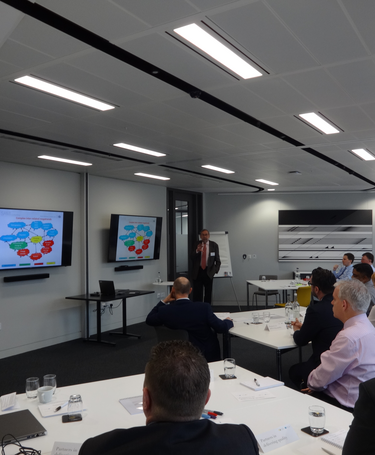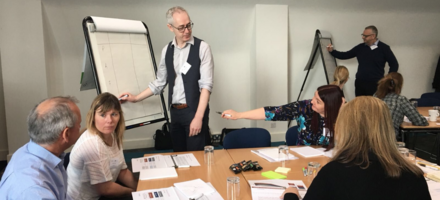
Planning for different possibilities
Progress indicator
Huw Williams, Principal at SAMI Consulting, talks to Alicia Dimas about how quality professionals should be planning for different future scenarios and what changes are most likely to disrupt their organisations.
QW: During your recent presentation about new trends and emerging issues that will affect quality professionals in the future, for CQI’s Corporate Connect event ‘Scenario Planning and Future’s Thinking’, the quality professionals present were particularly worried about how new technologies will affect their work in the future. Do you think these professionals are so focussed on technology that they are actually overlooking other important trends?
Huw: That is almost inevitable and it’s not just quality professionals that think this way. However, as scenario planners, we try to get people to think about other topics as well. Besides technology, you also need to think about future trends for politics, society, economics and other areas.
For instance, the different attitudes of the younger generations are something your business has to consider because they affect your workforce and the shape of your market.
Another example is the recent collapse of Carillion [British construction company]. That was a sort of economic shock that came from nowhere, and nobody was planning for it. But companies could have been looking at how industry structures are changing, and what risks are associated with this, to be able to develop contingency plans. So, while some SMEs [small and medium enterprises] are going to go out of business because of Carillion’s collapse, others who had a contingency plan in place will be able to take things forward.
QW: In your opinion how can big data tools help organisations prepare for the future?
Huw: With the Internet of Things we are capturing data constantly, so in the future there will be far more data than you have today. Big data tools will be able to help you spot patterns within that data, and draw conclusions from it (for instance about the way the market is changing).
I see the Internet of Things, big data analysis, and artificial intelligence as all coming together as one big groundbreaking set of changes that everyone needs to get their head around. These three technologies are going to be so huge over the next 10 years that everybody ought to be trying to work out what they mean for their organisation and their profession.
QW: During your presentation you also mentioned environmental changes, demographic changes, and other factors that people don’t seem to give as much importance as they do to technology changes…
Huw: That is true, partly because some of those changes will only impact your business in the future, and partly because they are facts that you can’t do much about, or you are not yet aware of what they might mean for your business. But thinking about these uncertainties will help you build more robust plans.
QW: During your presentation, you spoke about different future scenarios: evolution, transformation, exploitation or fragmentation. Are organisations prepared for these different possibilities?
Huw: Probably not. Most organisations tend to have one set view of the future. They will just assume that tomorrow is pretty much like today. But the one thing you know for sure is that tomorrow won’t be the same as today. There will always be change and some things will be different.
For instance, two years ago everyone would assume that the United Kingdom would be part of the European Union for many years to come, and all of their business plans would have been based on that fact. Now suddenly we are leaving, and people are scrambling around trying to build new business plans. Some businesses might be ahead of the game, if they thought of that scenario previously.
These are just examples from one project – other scenarios may be more useful for different organisations.
QW: During the event, you told participants to “beware of the illusion of certainty”. Can you explain to our readers what do you mean by this?
Huw: We call it the ‘denial principle’. If you get a politician, or an expert, coming out and saying something couldn’t possibly happen, you have to realise that they wouldn’t bother saying it if people weren’t suggesting it was possible. It’s a signal that something is bubbling underneath the surface, something that the established order doesn’t accept. It’s an interesting signal that these are things you need to be planning for and worrying about.
For example, during the US presidential campaign, Barack Obama was saying there was no way that Trump was going to be president. This is an example of the illusion of certainty and how quality professionals need to be aware of it and make contingency plans.
QW: In your opinion, in what ways can the quality profession change in the future?
Huw: I think there will be opportunities for the quality profession to raise its profile and start being seen as a strategic activity. Technology changes will probably enable the more routine elements of the quality professional’s job to be automated, therefore the quality professional won’t be bogged down in doing the ordinary stuff, but will instead be able to deal with more strategic issues and operate at a more influential level.
QW: During your extensive career, what are the main changes you have seen in strategy and scenario planning for organisations?
Huw: Most of my career was spent at British Telecom (BT) where I did a number of different strategy jobs. My background is in mathematics and mathematical modelling. I used to produce quantitative forecasts for the future. However, over the years I came to realise that there is no one future reality, but there are different interpretations of what’s happening today and how they will influence the future.
BT used to have a culture where it liked to have very accurate five-year forecasts for all its different products. These, of course, were inevitably wrong because you just can’t forecast things that far ahead. This was particularly true at a time when there was significant change in the telecoms industry: new competitors were emerging all the time, the shape of the market was changing, and broadband was taking over from voice as being the most important product. The only thing you can do is try to build some different scenarios for the future. I started to push for that approach, rather than the more straightforward predictive approach to modelling.
Quality World

Get the latest news, interviews and features on quality in our industry leading magazine.

